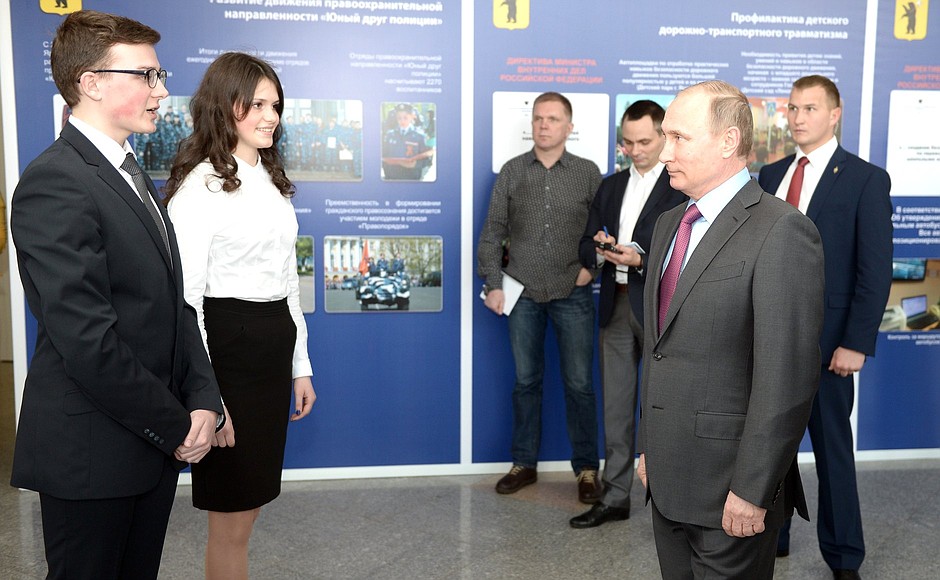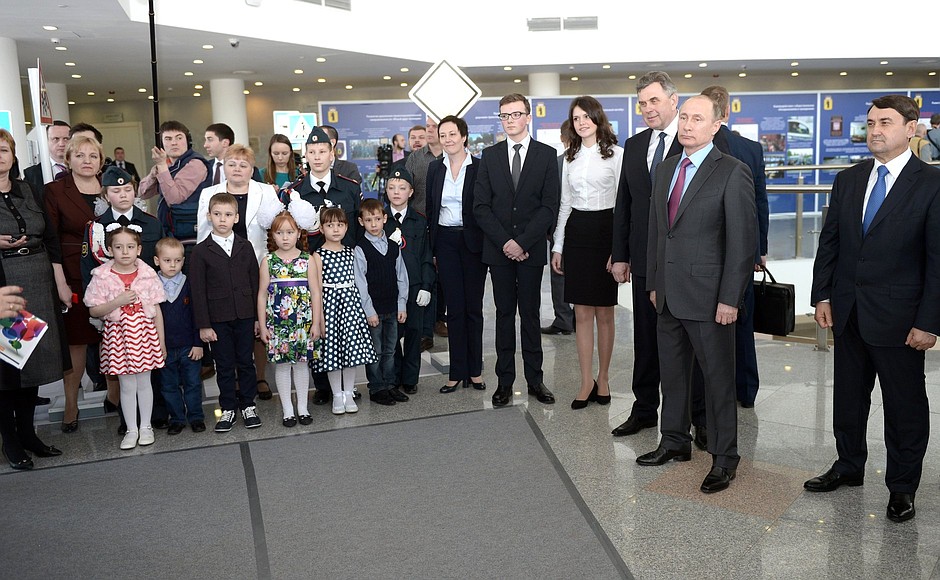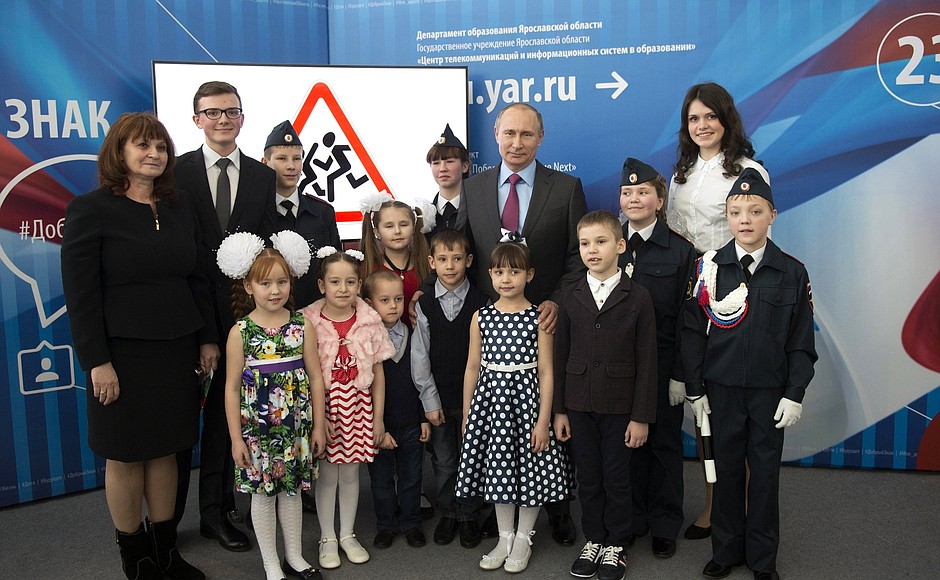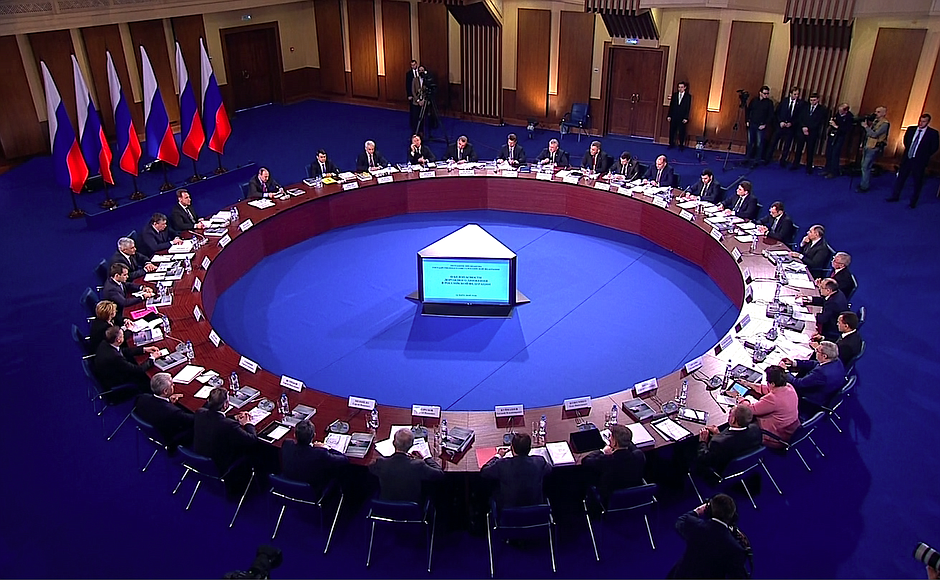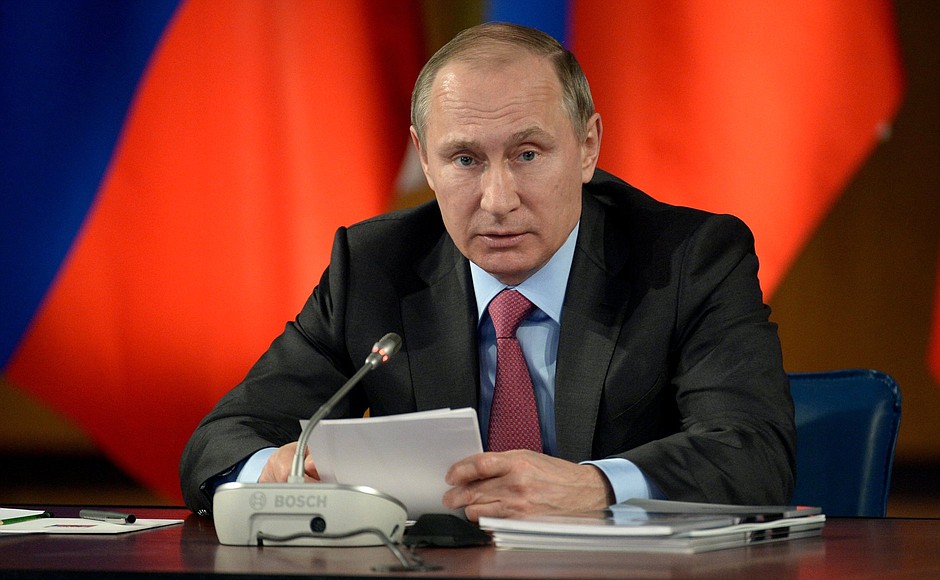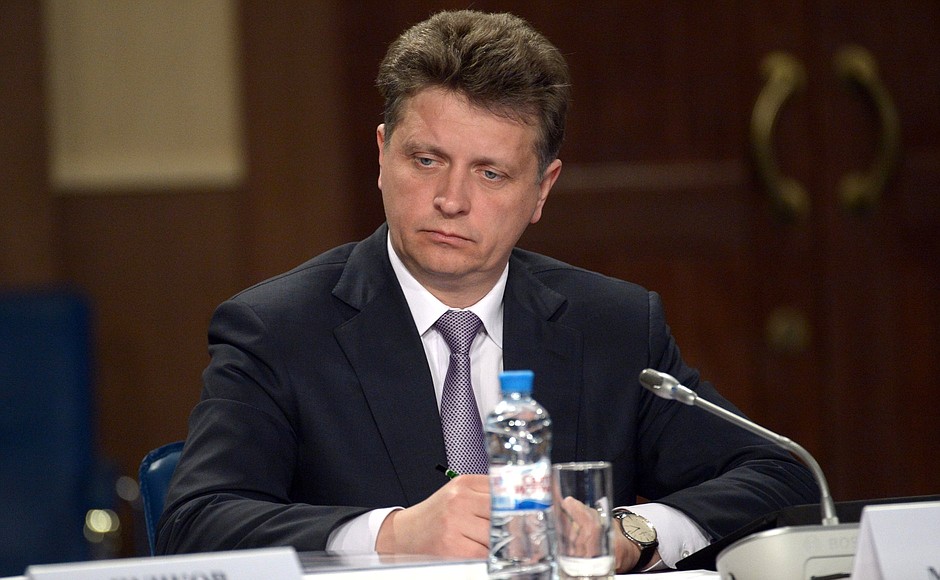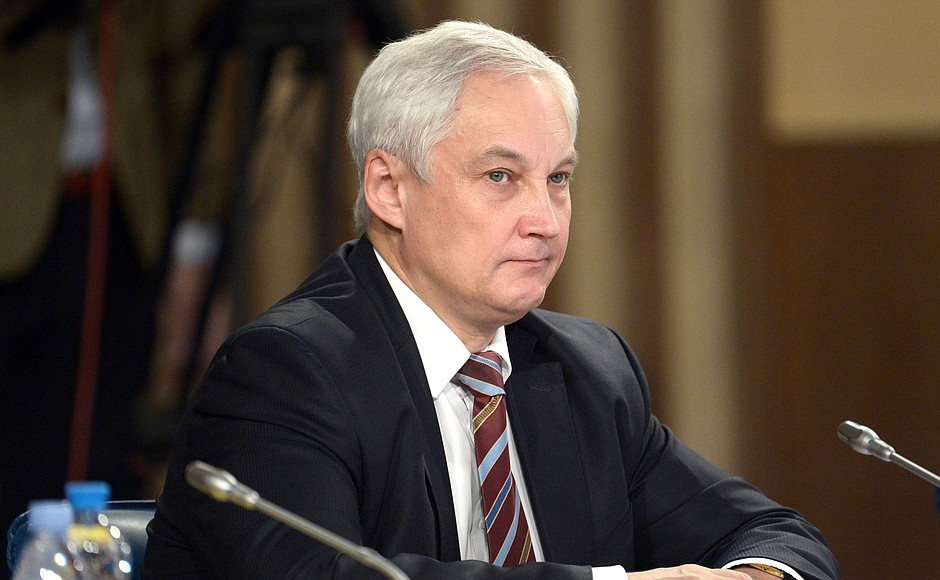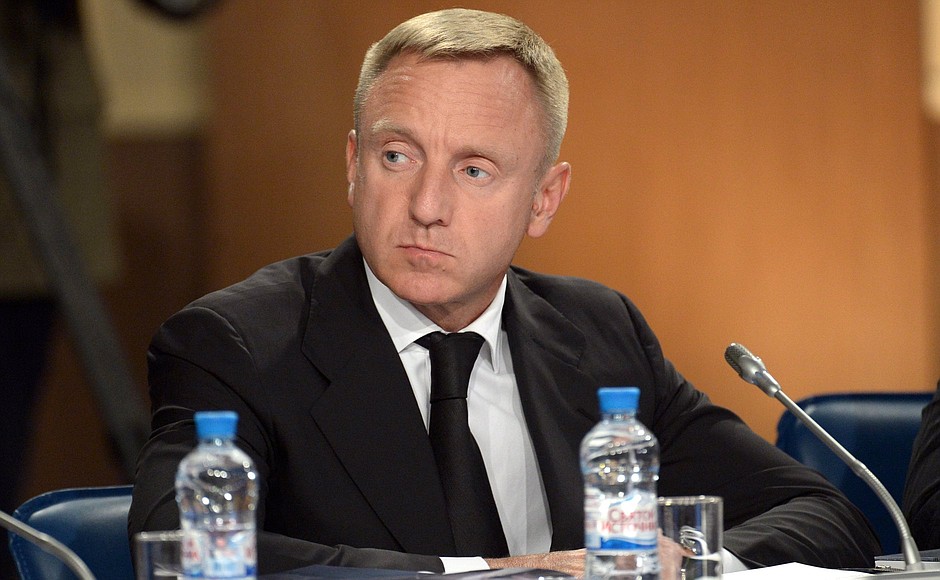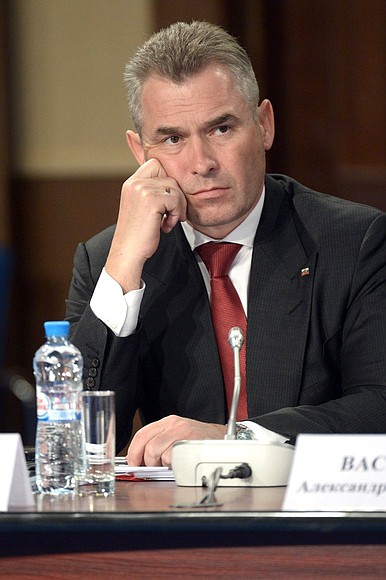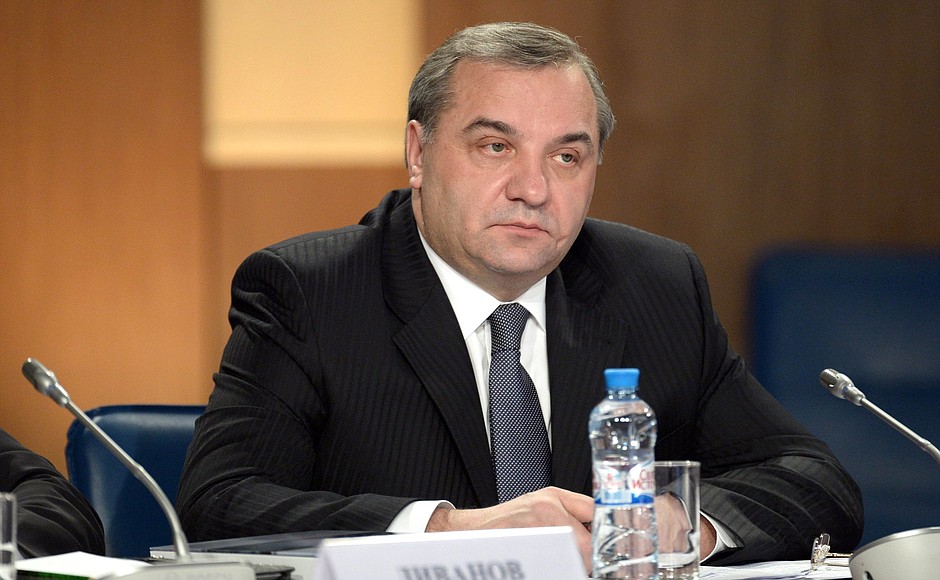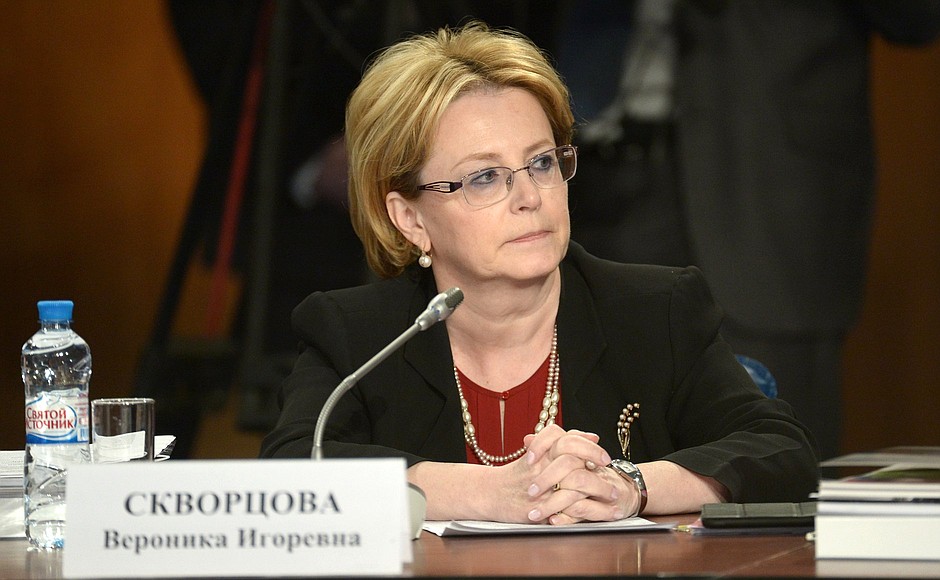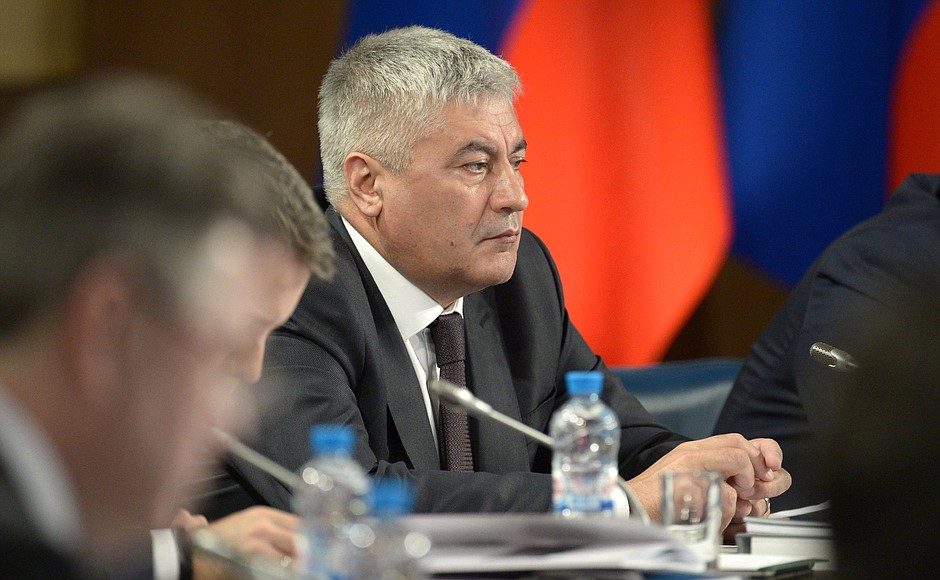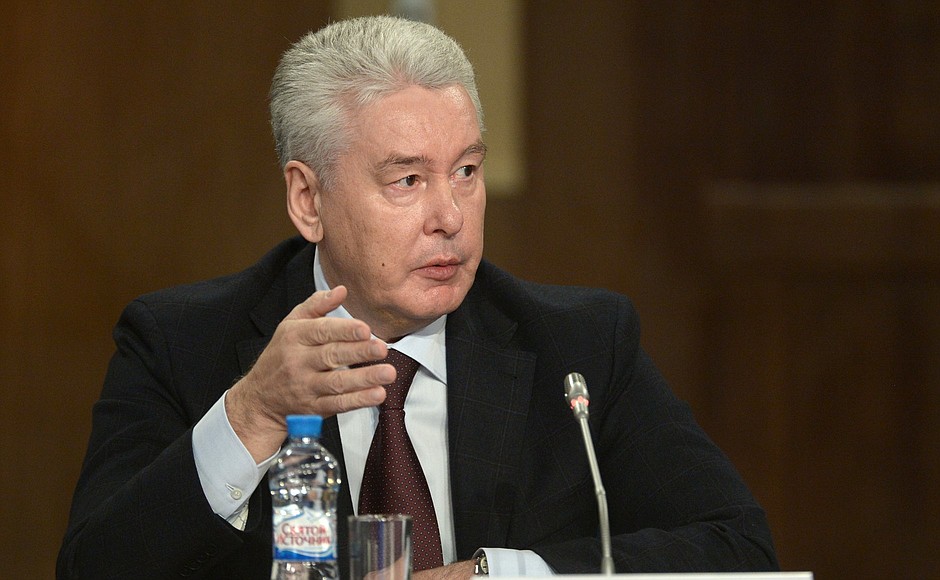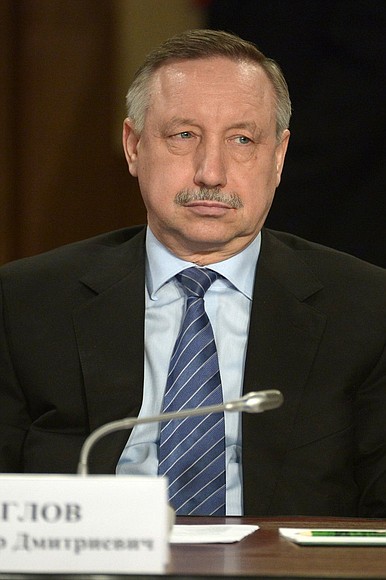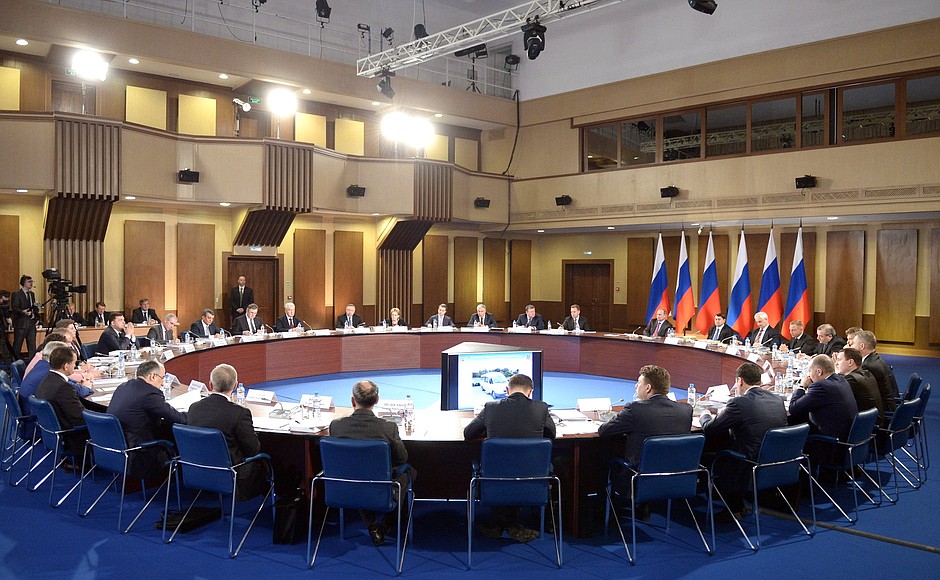Before the meeting began, the President visited the exhibition Modern Technology in Road Safety. Safety. Comfort. Control.
* * *
President of Russia Vladimir Putin: Good afternoon, colleagues.
Improving road safety is the main item on our agenda today. The big issue here is to save lives, the lives of thousands of our fellow citizens. We all understand that this is an absolutely fundamental task for state policy. Let me add that the road safety level has a direct impact on stable socioeconomic development and the effective operation of Russia’s entire transport infrastructure.
We discussed this issue in detail at an earlier State Council Presidium meeting, back in 2005, a long time ago. That meeting resulted in needed amendments to the laws and changes to the road code. It also led to the approval and implementation of the 2006–2012 federal targeted programme in this area.
Particular emphasis was put on repairing and reconstructing roads and motorways and generally improving the entire road infrastructure. We began using new traffic logistics technology, improved organisation of medical aid at the scene of traffic accidents, and also put in place better monitoring of road safety violations and faster response to such incidents.
Over these last years, the number of road accidents has dropped by 11.8 percent and social and transport risks are now considerably lower. At the same time, the number of cars on the roads has increased around the country and we now have 300 cars on average per 1,000 people. The number of cars will continue to grow, of course, and this creates an objective challenge for everyone using the roads and for the people responsible for organising traffic.
I want to stress that just because we see more and more cars on the road, we cannot and should not make the excuse that accidents and their tragic consequences are therefore inevitable. On the contrary, we must achieve a dramatic reduction in the number of people killed and injured in road accidents.
I remind you that over the last decade, more than 3 million people have been injured in road accidents and 350,000 people have been killed on the roads over this time. This is a terrible figure, equivalent to the population of a sizeable city. These are terrible and senseless losses that we could avoid. The vast majority of these tragedies were the fault of drivers themselves: aggression and lack of respect for people on the roads is usually the cause of the serious accidents.
The key task is therefore to foster a driving culture grounded in strict respect for the road rules, competent behaviour and goodwill on the roads, and awareness of our responsibility for our own lives, the lives of our loved ones, and the safety of all road users.
See also
This kind of culture cannot be developed overnight, of course, and it must proceed in parallel with tougher penalties for road safety violations. We see in practice that these kinds of measures have helped solve the problem of getting people to wear seat belts, for example, and installing child seats, or restraining devices, as the specialists call them, in cars.
This and other solutions have helped to halve the number of people killed on our urban roads, but the number of road accident victims still remains unjustifiably high nevertheless.
Last May, I instructed the Government to take additional measures to reduce road accident mortality. Last August, the Government approved an action plan that included provisions for submitting 13 draft laws to the State Duma. The deadlines have all come and gone, and only one of these draft laws is actually before the State Duma now; the others are still going through the approvals process in the Government. I ask the heads of the ministries and agencies responsible for drafting these documents to take personal responsibility for bringing them before the State Duma so that they can be passed during the spring session this year, as was planned. I repeat that reducing the death toll from road accidents is our main task.
Many people are still getting killed at pedestrian crossings. This figure came to more than 1,000 people last year. I think we should impose tougher penalties on drivers for breaking the rules at pedestrian crossings. In 2015, the number of accidents at pedestrian crossings increased by 2 percent compared to 2014. There were 19,779 violations in total, and 1,233 people were killed.
Crossing into the oncoming lane remains the most common type of serious violation. Penalties that include losing one’s licence do not stop reckless drivers, and their irresponsible driving kills innocent people. I think the Government should draw up a comprehensive and systematic action plan to resolve this problem. Greater use should be made of preventive measures, including by the traffic police. They should not just note the violations, but should also be engaged in practical organisation of safe traffic on the roads.
Efforts to prevent road accidents and educate people should involve in broad fashion the media and the public and make use of all the possibilities offered by the Internet. This is particularly effective at the regional and municipal level. Here, at this State Council Presidium meeting, we could formulate specific recommendations for the regions on closer cooperation with the media and with civil society organisations.
At the exhibition just before, the deputy mayor of Moscow put forward a request that has come more often of late from a number of regions. This concerns the matter of transferring to the regions the power to impose and collect fines for traffic violations. This is something we could consider, given that the regional and municipal authorities are largely responsible for work in this area. Some regions are ready to carry out programmes to install devices to catch speed violations on federal motorways. The fines collected would go into the regional road funds.
I think this would be useful for the regions and the federal authorities. Of course, we would need to discuss in detail the criteria for transfer of these powers with the Government and the regional heads.
Colleagues, we all understand that road safety is a complex issue and the authorities at every level, relevant agencies and economic actors all have an important part to play. Clearly, we need effective coordination of work between all of the different organisations. We see what lack of coordination leads to, including in the accidents that occur because of road problems, cited as a cause for one in three accidents on our roads. Around four percent of road accidents happen regularly at roadwork sites, for example. 20 people were killed last year and 113 were injured all because there is still no regulation making it a requirement to equip potentially dangerous stretches of road accordingly. Local authorities point the finger at the road repair services, and the repair people lay the blame on the road safety inspectors, and meanwhile, we make no progress in resolving this obvious problem.
As you know, there is no shortage of such issues. We all know the problem with road quality – this goes without saying and is a major issue of its own and related to financing problems. But these issues concerning roadwork organisation are things that we can resolve.
In this respect, the State Council’s working group proposes that the Government decide exactly which federal agencies are responsible for organising traffic and road safety. We will discuss these proposals in detail today.
The time has come for legal regulation of transport development, taking into account the need to ensure road safety and rapid and effective management. Each regional or local project in this area should be part of a common coordinated system for the country’s main transport networks, and the standards for new construction and repairs to existing roads and road infrastructure facilities should take into account all safety aspects.
Let me say a few words about some of the main tasks. First, we need to make broader use of insurance. This is something that should be part of training for drivers. The insurance culture should be part of the set of skills they learn as drivers and should foster their sense of personal responsibility. This is also essential for them to protect their own interests and for ensuring safety on our roads.
To get rid of excessive inconvenience and formalities, we should implement measures that allow people to register accidents without having to have the police present (this is the sense of the proposal from the Moscow City Hall). Of course, this would be possible only in cases where accidents involve material damage only. Not all road users are ready for this kind of independent action yet, but this is the way of the future and these principles should become as much second nature for drivers as is having car insurance.
I therefore ask the Bank of Russia and the insurance companies to take effective measures to prevent the spread of fake insurance policies. This has become a mass-scale problem of late and not only causes losses for ordinary people but also damages the insurance business’ reputation.
Teaching children road safety rules is another important task. I saw a demonstration just before of how this work is organised in Yaroslavl Region. I want to thank the Governor and everyone working on this, including school principals, who make space and time available at their schools for work with school and kindergarten pupils. But we need special programmes to teach children road safety in our schools and we need centres for preventing road injuries among children. This is a common task for the federal and regional authorities and also for the business community, particularly the insurance business, which can make a solid financial contribution to organising road safety programmes.
The next main area is organising swift medical aid for those injured in road accidents. As I said, much progress has been made in this area, including developing the system of specialised medical institutions.
Last year, ERA-GLONASS began operation. The state automated information system of emergency response to accidents sends the signal about road accidents to the relevant services. We are now producing vehicles fitted with this system’s terminals and this makes it possible to save accident victims’ lives.
Unfortunately, the ERA-GLONASS device has not been installed en masse in cars. I think we all realise how important this issue is, especially the car manufacturers, who we hope will get actively involved in this work. Overall, we need to do everything we can to ensure that all of the aid services respond without failure to all signals about road accidents.
Colleagues, there are many other issues that we also need to discuss. I hope that you will make a comprehensive examination of all of the issues in your presentations today.
Let’s begin our work.
<…>
Colleagues, let’s sum up the discussions here.
I want to thank the State Council working group for preparing this vitally important subject and Svetlana Orlova [head of the State Council road safety working group and Governor of Vladimir Region] for heading this work.
In conclusion, I want to say that I get the impression that we take this very serious problem rather lightly and look at it superficially, as a simple everyday banality. Our people’s prosperity is not growing as fast as we would like, of course, and our people certainly deserve more and better, but at the same time, as far as personal transport goes, the number of cars is growing fast, and the quality and unfortunately, the extensiveness of our road network lags behind this growth in the number of cars on the road.
As I said in my opening remarks, we should have made a timely response to this situation and taken the appropriate measures, but we did not do this, and now we have these huge losses – 30,000–35,000 people a year killed on our roads. This is a nightmare.
But all of these problems can be resolved if we work purposefully and with persistence. Of course this involves a whole range of issues: financing, administrative regulation, improving the laws, education, and healthcare aspects. This is all part of the federal, regional and local authorities’ direct responsibilities.
We examined practically every aspect of this issue today. I hope that what we agreed on and what we heard in the discussions will be implemented in practice. But if we really want to resolve this extremely important issue, we cannot take piecemeal action from one meeting to another, but must make an ongoing effort and put this work at the centre of the federal, regional and local authorities’ attention, and the public’s attention too, of course. I ask you all to make this united and responsible effort.
Thank you.
